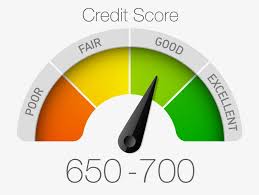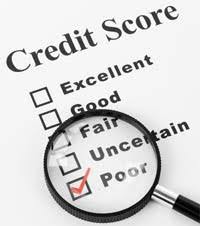 If you are seeking a loan, your credit score will be a determining factor as to whether or not you will be approved. Your credit score is a very important rating that makes you eligible or ineligible for a loan. A credit score is a 3-digit number that is specific to you – taking into account how you’ve dealt with credit in the past.
If you are seeking a loan, your credit score will be a determining factor as to whether or not you will be approved. Your credit score is a very important rating that makes you eligible or ineligible for a loan. A credit score is a 3-digit number that is specific to you – taking into account how you’ve dealt with credit in the past.
credit
 Do you know what your credit score is? If you answered no, don’t feel bad. Most people couldn’t tell you with any kind of accuracy the number on their credit report, even though it has the potential to impact their lives in a major way. Suppose, for example, that you’ve finally managed to set aside a decent amount of money towards a down payment on a home. However, when you go to a bank seeking approval for a loan, you could discover that ancient black marks on your credit report related to massive credit card debt and a spotty payment history will set you back significantly. Even if you cleared up these issues a long time ago, a failure to check your credit report could mean that they’re still dragging down your rating, leaving you with fewer (and less appealing) options when it comes to taking a major loan. In short, there are plenty of reasons why you should check your credit report on an annual basis. Here are a few that should get you going.
Do you know what your credit score is? If you answered no, don’t feel bad. Most people couldn’t tell you with any kind of accuracy the number on their credit report, even though it has the potential to impact their lives in a major way. Suppose, for example, that you’ve finally managed to set aside a decent amount of money towards a down payment on a home. However, when you go to a bank seeking approval for a loan, you could discover that ancient black marks on your credit report related to massive credit card debt and a spotty payment history will set you back significantly. Even if you cleared up these issues a long time ago, a failure to check your credit report could mean that they’re still dragging down your rating, leaving you with fewer (and less appealing) options when it comes to taking a major loan. In short, there are plenty of reasons why you should check your credit report on an annual basis. Here are a few that should get you going.
Awareness. If you don’t know what your credit report says you can hardly expect to improve it. And if you want to make any major purchases in the future (a car, a home, a business, etc.) you need to have a top-tier score in order to get the stellar interest rates and other terms that you’re seeking. Your credit score can not only make or break your chances at loan approval, but also your ability to attain rates that you can actually afford to repay. So before you even think about looking for a loan, you should check out your credit report to see if you’ll even qualify.
The Pros And Cons Of A Student Credit Card
There are plenty of ways that a student could benefit from obtaining a student credit card. It is a great way to begin learning how to properly budget your finances to avoid debt. At the same time, debt may be the very reason a student would want to avoid a credit card. It is known that many credit card companies wish to provide cards to student with the understanding that they would use it irresponsibly. That may not sound beneficial for the credit card company, but the truth is that a card user in debt is worth more to the credit card company than someone who pays their monthly amount without hesitation. The credit industry is very different than it once was.
Take Steps To Improve Your Personal Finances In 2012 By Avoiding These 5 Credit Card Missteps
 The season of resolutions is upon us, and one resolution we could all serve to make (and keep) is to cut down on our credit card missteps. After all, consumers are quickly racking up new credit card debt, which is the type of dangerous overleveraging that got us into deep you-know-what during the Great Recession. What’s more, 41% of U.S. adults would give their personal finance knowledge a grade of “C” or worse, according to the National Foundation for Credit Counseling’s 2011 Consumer Financial Literacy Survey. So, to help get this resolution started, here are 5 credit card mistakes that we can all excise from our lives during 2012:
The season of resolutions is upon us, and one resolution we could all serve to make (and keep) is to cut down on our credit card missteps. After all, consumers are quickly racking up new credit card debt, which is the type of dangerous overleveraging that got us into deep you-know-what during the Great Recession. What’s more, 41% of U.S. adults would give their personal finance knowledge a grade of “C” or worse, according to the National Foundation for Credit Counseling’s 2011 Consumer Financial Literacy Survey. So, to help get this resolution started, here are 5 credit card mistakes that we can all excise from our lives during 2012:
1. Not having an open credit card in your own name
Whether or not you feel comfortable making purchases with a credit card is basically immaterial. Simply having a credit card under your own name (not as an authorized user) is the easiest way to add positive information to your major credit reports on a monthly basis, and this information will be relayed even if you lock your card away in a drawer. Since one’s credit score is integral to getting the best loan terms, leasing a car, renting an apartment or getting certain jobs, this advice applies to pretty much everyone over the age of 18.
Wait, doesn’t the new credit card law preclude people under the age of 21 from opening credit cards? Actually, no. Young people must simply ask a relative to be a co-signer or indicate on their application that they have sufficient assets/income to cover a credit card’s monthly minimum payments (typically around $15 for newcomers).

 Your credit score might just be a few numbers on a screen, but it can determine a surprising amount of factors in your life. For example, did you know the following can – and do – check your credit score?
Your credit score might just be a few numbers on a screen, but it can determine a surprising amount of factors in your life. For example, did you know the following can – and do – check your credit score?